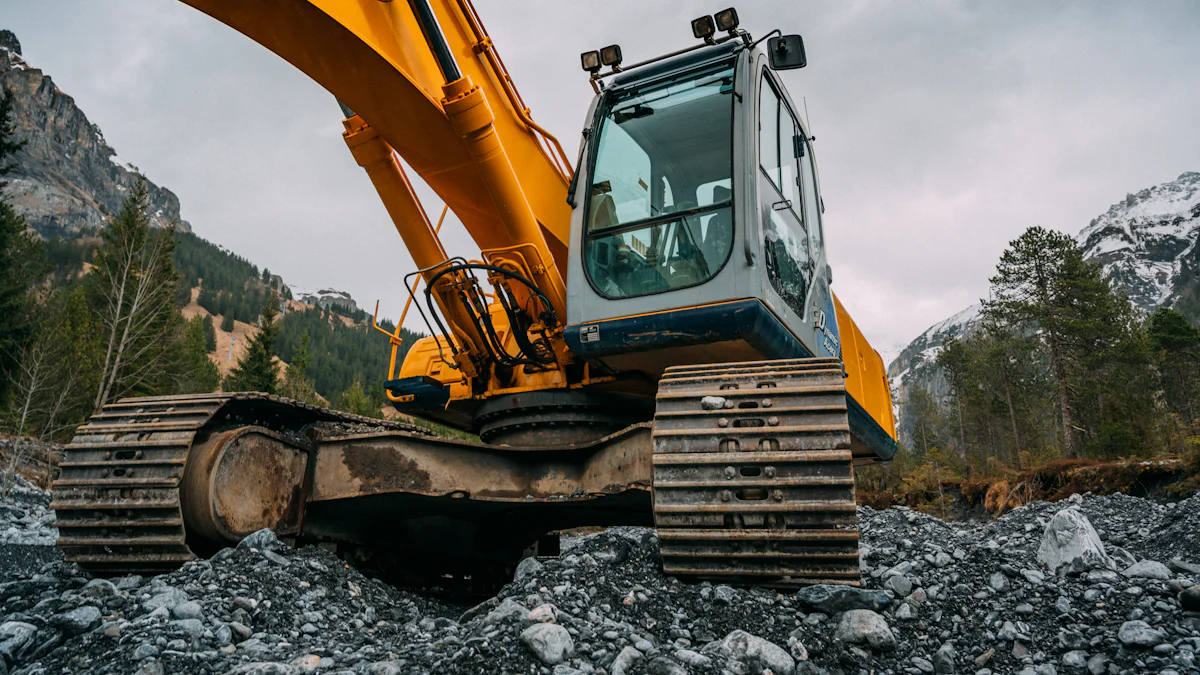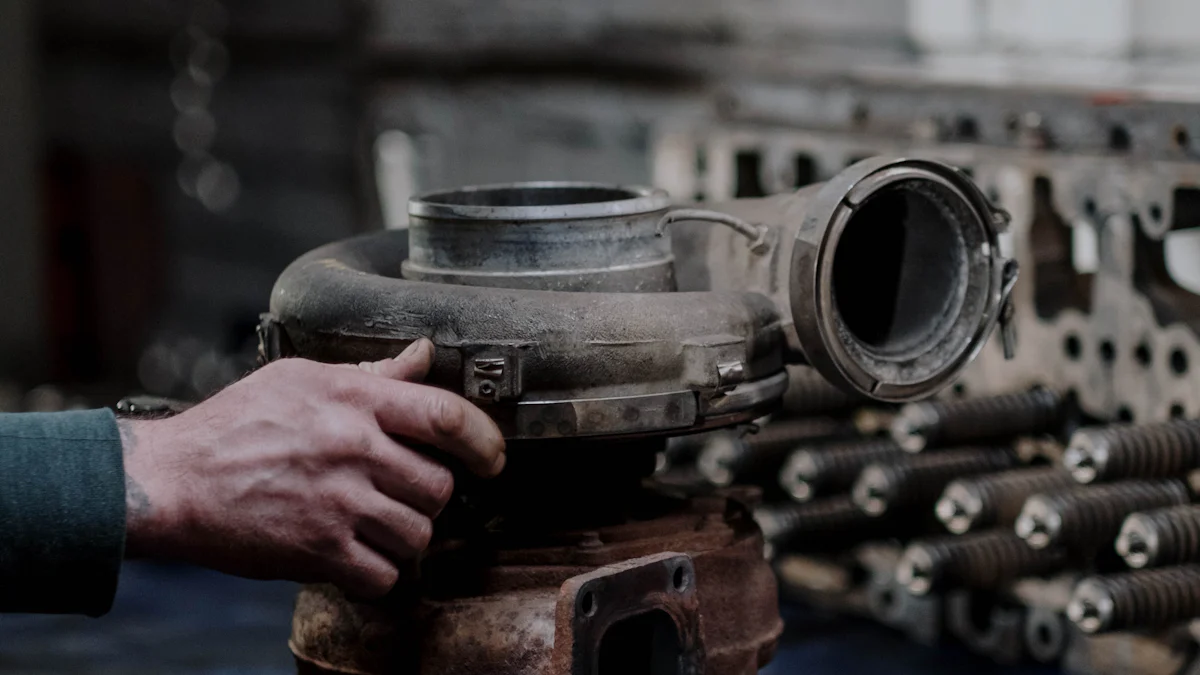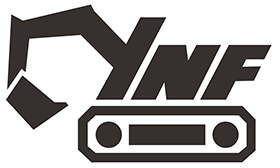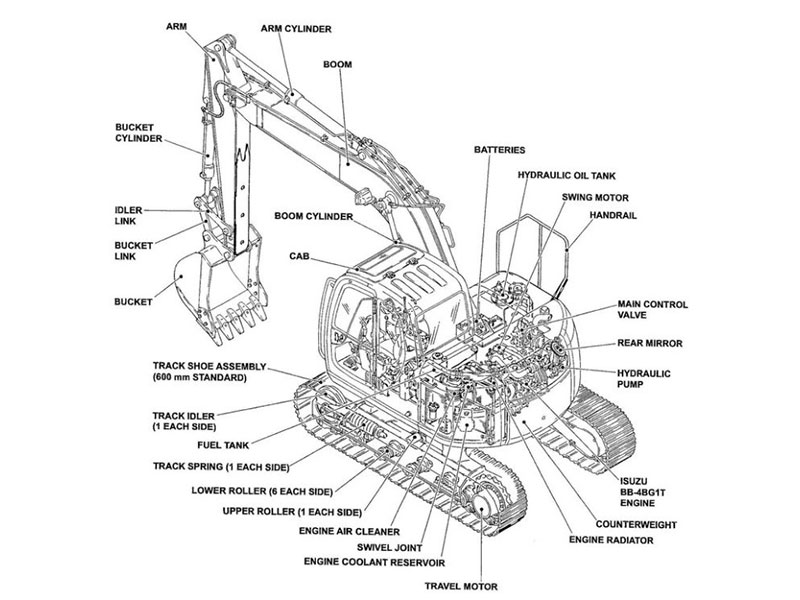
Mini excavators rely on a robust mini excavator engine parts system to deliver the power needed for demanding tasks. Each component plays a vital role in ensuring smooth operation and reliability. From generating energy to regulating temperature, these parts of an excavator work in harmony to maintain peak performance. Proper understanding of their functions not only enhances efficiency but also ensures ease of maintenance. Regular care and timely repairs of mini excavator engine parts can prevent costly breakdowns, extending the lifespan of your machine and keeping it ready for action.
Key Takeaways
Understanding the essential engine parts, such as the cylinder block, pistons, and crankshaft, is crucial for maintaining your mini excavator’s performance and longevity. Regular maintenance of engine components can prevent costly breakdowns and extend the lifespan of your machine, ensuring it remains efficient for demanding tasks. Investing in high-quality parts from trusted suppliers like YNF Machinery enhances engine performance and reduces the risk of unexpected failures.
Prioritize the upkeep of the fuel and air intake systems to improve combustion efficiency, which directly impacts fuel consumption and overall productivity.
A well-maintained cooling system is vital for regulating engine temperature, preventing overheating, and ensuring optimal performance.
Routine inspections of the electrical and lubrication systems help identify potential issues early, safeguarding the reliability of your excavator.
By following best practices for maintenance and using reliable components, you can maximize your mini excavator’s productivity and minimize downtime.
Cylinder Block: The Foundation of Mini Excavator Engine Parts

Structure and Function
The cylinder block serves as the backbone of your mini excavator’s engine. It houses the cylinders, where the combustion process generates the power needed to operate the machine. This component encloses and supports critical parts like pistons, connecting rods, and the crankshaft. Its robust design ensures the engine can withstand high pressure and temperature during operation. Made from durable materials, the cylinder block maintains structural integrity even under demanding conditions. Without this essential part, the engine’s performance and reliability would be compromised.
The cylinder block also plays a vital role in facilitating the flow of coolant and oil. Coolant passages within the block help regulate the engine’s temperature, preventing overheating. Oil passages ensure proper lubrication of moving components, reducing friction and wear. These functions make the cylinder block indispensable for maintaining the efficiency and longevity of your mini excavator engine.
Importance in the Main Components of an Excavator
Among the main components of an excavator, the cylinder block stands out as a foundational element. It provides the structural framework that holds the engine together. This part ensures that all other engine components function in harmony. A well-maintained cylinder block contributes to the overall stability and performance of the machine.
The durability of the cylinder block directly impacts the reliability of your excavator. High-quality cylinder blocks, like those offered by YNF Machinery, are designed to endure the stress of heavy-duty operations. Investing in a reliable cylinder block reduces the risk of engine failure, minimizing downtime and repair costs. Understanding its importance helps you prioritize regular inspections and maintenance, ensuring your excavator remains in peak condition.
Pistons: Power Generators in Mini Excavator Engine Parts
Role in the Combustion Process
Pistons play a critical role in the combustion process of your mini excavator’s engine. Positioned within the cylinders, they move up and down to compress the air-fuel mixture. This compression creates the necessary conditions for combustion, which generates the energy required to power the machine. When the mixture ignites, the resulting explosion forces the pistons downward, converting chemical energy into mechanical energy.
The design and material of pistons significantly influence engine efficiency. High-quality pistons ensure smooth movement and optimal compression, which leads to better combustion. Poorly maintained or damaged pistons can disrupt this process, reducing engine performance and increasing fuel consumption. Regular inspections and timely replacements keep the pistons functioning effectively, ensuring your excavator operates at its best.
Importance for Generating Power
Pistons are the primary components responsible for generating power and torque in your mini excavator’s engine. Their movement drives the crankshaft, which transforms the pistons’ linear motion into rotational force. This rotational force powers the hydraulic system, enabling the boom, arm, and bucket to perform various tasks with precision and strength.
The durability of pistons directly impacts the engine’s ability to handle heavy loads. High-performance pistons, like those found in YNF Machinery’s engine parts, are designed to withstand extreme pressure and temperature. This ensures consistent power output, even during demanding operations. By maintaining the pistons in good condition, you can maximize your excavator’s productivity and minimize downtime.
Investing in reliable pistons not only enhances engine performance but also reduces wear on other components. This contributes to the overall longevity of your machine, saving you time and money in the long run. Understanding the importance of pistons helps you prioritize their maintenance, ensuring your mini excavator remains a powerful and efficient tool.
Crankshaft: A Key Component in the Best Engine for a Mini Excavator
Function in Power Transmission
The crankshaft plays a pivotal role in the operation of your mini excavator’s engine. It converts the linear motion of the pistons into rotational motion, which powers the machine. This transformation is essential for transferring energy from the engine to other critical systems. Without a functioning crankshaft, the engine cannot deliver the rotational force required to drive the excavator.
A well-maintained crankshaft ensures smooth power transmission, reducing stress on other engine components. Its robust design allows it to handle the immense forces generated during combustion. High-quality crankshafts, like those found in the best engine for a mini excavator, are built to endure heavy loads and continuous operation. Regular inspections and proper care of this component help maintain the efficiency and reliability of your machine.
Importance for Hydraulic Systems
The crankshaft’s role extends beyond power transmission. It directly impacts the performance of the hydraulic system, which is one of the main components of an excavator. The rotational motion generated by the crankshaft drives the hydraulic pump, enabling the system to function effectively. This system powers the boom, arm, and bucket, allowing your excavator to perform tasks with precision and strength.
A durable crankshaft ensures consistent power delivery to the hydraulic system, maintaining its efficiency. Any issues with the crankshaft can disrupt the hydraulic system’s operation, leading to reduced performance and potential downtime. Investing in a reliable crankshaft ensures that your excavator can handle demanding tasks while maintaining optimal power and torque.
By prioritizing the maintenance of your crankshaft, you safeguard the performance of both the engine and the hydraulic system. This not only enhances the productivity of your mini excavator but also extends its lifespan, saving you time and money in the long run.
Fuel System: Ensuring Efficiency in Mini Excavator Engine Parts
Components of the Fuel System
The fuel system in a mini excavator engine consists of several interconnected components that work together to supply fuel efficiently. These include:
Fuel Tank: Stores the diesel fuel required for the engine’s operation.
Fuel Pump: Transfers fuel from the tank to the engine at the required pressure.
Fuel Injectors: Spray fuel into the combustion chamber in a fine mist for optimal mixing with air.
Fuel Filters: Remove impurities and debris from the fuel, ensuring clean delivery to the engine.
Each component plays a critical role in maintaining the engine’s performance. For example, the fuel pump ensures a steady flow of fuel, while the injectors guarantee precise delivery for efficient combustion.
Function and Importance for Combustion
The fuel system’s primary function is to deliver the right amount of fuel to the engine for combustion. This process begins with the fuel pump drawing diesel from the tank and sending it to the injectors. The injectors then atomize the fuel, mixing it with air in the combustion chamber. This mixture ignites, generating the energy needed to power the mini excavator.
Efficient fuel delivery directly impacts the engine’s performance and fuel efficiency. A well-maintained fuel system ensures that the engine operates smoothly, reducing fuel consumption and emissions. Diesel engines, known for their superior fuel efficiency, provide more power per gallon compared to gasoline engines. This advantage allows your mini excavator to run longer without frequent refueling, minimizing downtime and boosting productivity.
A reliable fuel system not only supports efficient combustion but also reduces operational costs, making it an essential aspect of your excavator’s upkeep.
Cooling System: Protecting the Main Components of an Excavator

Components of the Cooling System
The cooling system in your mini excavator consists of several essential components that work together to maintain the engine’s temperature. These include:
Radiator: The radiator dissipates heat from the coolant, ensuring the engine stays within its optimal temperature range.
Cooling Fan: This fan enhances airflow through the radiator, improving heat dissipation during operation.
Coolant: A specialized fluid that absorbs heat from the engine and transfers it to the radiator for cooling.
Water Pump: This pump circulates coolant throughout the engine and radiator, ensuring consistent temperature regulation.
Thermostat: The thermostat monitors the engine’s temperature and controls the flow of coolant to maintain efficiency.
Hoses and Connections: These components transport coolant between the engine, radiator, and other parts of the system.
Each part plays a critical role in preventing overheating. For example, the radiator and cooling fan work together to release heat, while the water pump ensures the coolant flows efficiently. Regular inspections of these components help you identify potential issues early, reducing the risk of engine damage.
Function and Importance for Temperature Regulation
The cooling system’s primary function is to regulate the engine’s temperature during operation. As the engine runs, it generates significant heat. The coolant absorbs this heat and carries it to the radiator, where it is released into the air. The cooling fan boosts this process by increasing airflow through the radiator. The water pump ensures the coolant circulates continuously, preventing hot spots within the engine.
Maintaining the correct engine temperature is vital for fuel efficiency and overall performance. An overheated engine can lead to severe damage, including warped cylinder heads and cracked blocks. On the other hand, an engine running too cool may experience reduced efficiency and increased wear. The thermostat ensures the engine operates within its ideal temperature range, balancing performance and longevity.
To keep your cooling system effective, monitor coolant levels regularly and check for leaks or blockages. Flushing the system at recommended intervals removes contaminants that can degrade performance. Clean air filters also support the cooling process by ensuring proper airflow. By prioritizing maintenance, you can enhance fuel efficiency, reduce downtime, and extend the life of your mini excavator.
Air Intake System: Clean Air for the Best Engine Performance
Components of the Air Intake System
The air intake system in your mini excavator ensures that the engine receives clean and sufficient air for combustion. This system consists of several key components:
Air Filter: The air filter prevents dirt, dust, and debris from entering the engine. It safeguards internal components and ensures the air entering the combustion chamber is clean. Over time, the filter can clog, reducing airflow and affecting performance. Regular replacement keeps the system efficient.
Air Intake Ducts: These ducts channel air from the environment to the engine. They are designed to minimize resistance and maximize airflow.
Throttle Body: This component controls the amount of air entering the engine. It adjusts based on the engine’s power requirements, ensuring optimal air-fuel mixture.
Mass Airflow Sensor (if applicable): This sensor measures the amount of air entering the engine. It helps the engine control unit (ECU) adjust fuel delivery for efficient combustion.
Each part plays a vital role in maintaining the engine’s performance. A well-maintained air intake system ensures that your mini excavator operates smoothly and efficiently.
Function and Importance for Combustion Efficiency
The air intake system’s primary function is to supply clean air to the engine for combustion. Air combines with fuel in the combustion chamber to create the energy needed to power your mini excavator. Clean air ensures efficient combustion, which directly impacts engine performance and fuel efficiency.
“At the heart of every engine is the combustion chamber where air and fuel mixtures come together for a mini fireworks show that powers your vehicle.”
When the air intake system functions properly, it delivers the right amount of air to the combustion chamber. This balance ensures that the engine burns fuel efficiently, reducing emissions and maximizing power output. A clogged air filter or damaged intake duct can disrupt this process, leading to poor performance and increased fuel consumption.
Regular maintenance of the air intake system is essential. Replace the air filter as needed to prevent dirt and debris from entering the engine. Inspect the ducts for cracks or blockages that could restrict airflow. By keeping these components in good condition, you ensure that your mini excavator remains powerful and efficient.
Investing in high-quality air intake components, like those offered by trusted brands, enhances the longevity of your engine. Clean air not only improves combustion efficiency but also reduces wear on internal parts, saving you time and money on repairs. Prioritize the upkeep of your air intake system to keep your mini excavator running at its best.
Exhaust System: Emission Control in Mini Excavator Engine Parts
Components of the Exhaust System
The exhaust system in your mini excavator consists of several essential components that work together to manage emissions and maintain engine efficiency. These include:
Exhaust Manifold: Collects exhaust gases from the engine’s cylinders and directs them into the exhaust pipe.
Exhaust Pipe: Channels the gases from the manifold to the muffler and out of the machine.
Muffler: Reduces the noise produced by the engine’s exhaust gases.
Catalytic Converter: Converts harmful pollutants in the exhaust gases into less harmful substances, helping meet emission standards.
Sensors: Monitor the exhaust gases to ensure the engine operates efficiently and complies with emission standards.
Each component plays a critical role in ensuring the exhaust system functions effectively. For example, the catalytic converter helps reduce harmful emissions, while the muffler minimizes noise pollution. Regular inspections and maintenance of these parts are essential to keep your mini excavator running smoothly and in compliance with regulations.
Function and Importance for Safe Operation
The exhaust system’s primary function is to safely remove exhaust gases from the engine and reduce harmful emissions. As the engine burns fuel, it produces gases like carbon monoxide, nitrogen oxides, and hydrocarbons. The exhaust system channels these gases away from the engine and operator, ensuring a safe working environment.
“A well-maintained exhaust system not only protects the operator but also contributes to a cleaner environment by reducing harmful emissions.”
Meeting emission standards is crucial for both environmental and regulatory reasons. The catalytic converter plays a key role in this process by converting toxic gases into less harmful substances. This ensures your mini excavator operates within legal limits and minimizes its environmental impact.
A properly functioning exhaust system also enhances engine performance. By efficiently removing gases, it prevents backpressure, which can reduce power output and fuel efficiency. Regular maintenance, such as checking for leaks or blockages, ensures the system operates effectively.
Investing in high-quality exhaust components helps you maintain compliance with emission standards while extending the lifespan of your mini excavator. Prioritizing the upkeep of this system not only protects the environment but also ensures safe and efficient operation on the job site.
Lubrication System: Extending the Lifespan of Excavator Engine Parts
Components of the Lubrication System
The lubrication system in your mini excavator consists of several essential components that work together to reduce friction and ensure smooth operation. These include:
Engine Oil: The primary lubricant that coats moving parts, reducing wear and dissipating heat. High-quality engine oil ensures optimal performance and longevity.
Oil Pump: Circulates the engine oil throughout the system, ensuring all components receive adequate lubrication.
Oil Filter: Removes contaminants and debris from the oil, preventing damage to engine parts.
Oil Pan: Stores the engine oil when the machine is not in operation.
Lubrication Passages: Channels within the engine block that direct oil to critical areas like the crankshaft, pistons, and bearings.
Each component plays a vital role in maintaining the efficiency of your excavator’s engine. For example, the oil filter ensures clean oil reaches the engine, while the oil pump guarantees consistent circulation. Regular inspections and maintenance of these parts help prevent costly repairs and extend the life of your machine.
Function and Importance for Reducing Friction
The lubrication system’s primary function is to minimize friction between moving parts in the engine. When the engine operates, components like the crankshaft, pistons, and bearings move at high speeds, generating heat and wear. Engine oil creates a protective film between these parts, reducing direct contact and preventing damage.
“Engine oil is the lifeblood of your excavator. It lubricates moving parts, reduces friction, and helps dissipate heat.”
Proper lubrication also helps regulate the engine’s temperature. By dissipating heat generated during operation, the oil prevents overheating, which can lead to severe damage. Additionally, it removes wear particles and sludge, keeping the engine clean and efficient.
To ensure optimal performance, choose an engine oil that meets or exceeds the manufacturer’s standards. Refer to your excavator’s operation manual for the recommended viscosity grade and performance requirements. High-quality oil not only protects the engine but also enhances its efficiency and longevity.
Regular oil changes are crucial for maintaining the lubrication system. Over time, oil degrades and becomes less effective. Replacing it at the recommended intervals ensures your engine remains properly lubricated, reducing wear and tear. Neglecting this maintenance can lead to increased friction, reduced performance, and costly repairs.
By prioritizing the upkeep of your lubrication system, you can extend the lifespan of your mini excavator’s engine parts.
Electrical System: Powering the Main Components of an Excavator
Components of the Electrical System
The electrical system in your mini excavator consists of several essential components that ensure the machine operates efficiently. These components include:
Battery: Supplies the initial power required to start the engine and supports other electrical functions when the engine is off.
Alternator: Recharges the battery and powers the electrical system while the engine runs.
Starter Motor: Initiates the engine’s operation by cranking it to start the combustion process.
Wiring Harness: Connects all electrical components, ensuring seamless communication and power distribution.
Control Panel: Houses switches, gauges, and indicators that allow you to monitor and control the excavator’s functions.
Sensors: Detect various parameters like temperature, pressure, and fuel levels, sending data to the control panel for real-time monitoring.
Lights: Provide visibility during low-light conditions, ensuring safe operation.
Each component plays a vital role in maintaining the functionality of your excavator. For example, the alternator ensures the battery remains charged, while the starter motor guarantees a smooth engine start. Regular inspections of these parts help you identify potential issues early, preventing unexpected breakdowns.
Function and Importance for Reliable Operation
It powers the ignition system, enabling the engine to start and run efficiently. It also supports the hydraulic controls, ensuring smooth operation of the boom, arm, and bucket.
“A well-maintained electrical system ensures uninterrupted operation, reducing downtime and enhancing productivity.”
The electrical system also plays a key role in safety and monitoring. Sensors provide real-time data on engine performance, alerting you to potential issues before they escalate. Lights improve visibility, allowing you to work safely in dim environments. The control panel gives you full command over the machine, ensuring precise operation.
To maintain the reliability of your electrical system, inspect the battery regularly and clean its terminals to prevent corrosion. Check the wiring harness for signs of wear or damage. Replace faulty sensors promptly to ensure accurate monitoring. By prioritizing these maintenance tasks, you can extend the lifespan of your excavator and avoid costly repairs.
Investing in high-quality electrical components enhances the overall performance of your mini excavator. Reliable parts ensure consistent power delivery, keeping your machine ready for demanding tasks. Understanding the importance of the electrical system helps you take proactive steps to maintain its efficiency, ensuring your excavator remains a dependable tool on the job site.
YNF Machinery’s Excavator Engine Parts and Couplings: A Trusted Choice
Overview of YNF Machinery’s Products
YNF Machinery has established itself as a trusted name in the excavator parts industry, offering a wide range of high-quality components designed to meet the demands of heavy-duty operations. Among its extensive product lineup, excavator engine parts and couplings stand out for their exceptional performance and reliability. These products are engineered to ensure your mini excavator operates efficiently, even under challenging conditions.
The excavator engine parts provided by YNF Machinery include essential components such as pistons, crankshafts, cylinder blocks, and fuel systems. Each part is crafted from durable materials to withstand high pressure, temperature, and friction. These components not only enhance engine performance but also contribute to the overall longevity of your machine. YNF Machinery also offers engine overhaul kits, injectors, turbochargers, and other critical parts, ensuring compatibility with various excavator models.
In addition to engine parts, YNF Machinery specializes in excavator couplings, which play a vital role in power transmission. These couplings are designed to connect the engine to the hydraulic pump system, ensuring smooth and efficient operation. With options like Centaflex-A, Bowex, and Monolastic couplings, YNF Machinery provides solutions tailored to different applications. The couplings are built to handle misalignment and axial displacement, making them a reliable choice for maintaining the durability and reliability of your excavator.
Why Choose YNF Machinery for Mini Excavator Engine Parts
Choosing YNF Machinery for your mini excavator engine parts ensures you receive products that combine quality, performance, and value. Here’s why YNF Machinery stands out:
Proven Durability and Reliability
YNF Machinery’s engine parts and couplings are designed to endure the rigors of heavy-duty use. The robust construction of these components ensures they can handle extreme conditions without compromising performance. This durability reduces the risk of unexpected breakdowns, saving you time and money on repairs.Wide Compatibility
YNF Machinery offers parts compatible with over 26 excavator brands, making it easy to find the right components for your machine. Whether you need OEM or aftermarket options, YNF Machinery provides products that meet or exceed industry standards.Cost-Effective Solutions
By offering competitive pricing without sacrificing quality, YNF Machinery ensures you get the best value for your investment. The availability of low minimum order quantities allows you to stock up on essential parts without overspending.Comprehensive Support
YNF Machinery goes beyond providing high-quality products. The company offers expert support to help you select the right parts for your excavator. From technical assistance to logistics support, YNF Machinery ensures a seamless purchasing experience.Global Reputation
With over 35 years of experience, YNF Machinery has built a strong reputation for delivering reliable excavator parts worldwide. Customers trust the brand for its commitment to quality and customer satisfaction.
Investing in YNF Machinery’s products means equipping your mini excavator with components that enhance performance and extend its lifespan. Whether you’re a contractor, equipment rental company, or excavator owner, YNF Machinery provides the solutions you need to keep your operations running smoothly.
Understanding the essential mini excavator engine parts and their functions is vital for maintaining your machine’s performance. Regular maintenance ensures the ease of maintenance and prevents costly repairs by addressing potential issues early. Replacing worn parts of an excavator, such as pistons or crankshafts, enhances fuel efficiency and extends the machine’s lifespan. YNF Machinery provides reliable parts of an excavator, offering durability and optimal performance. By investing in high-quality components and prioritizing upkeep, you ensure your mini excavator remains efficient and ready for demanding tasks.
FAQ
What are some key excavator engine parts that you should know?
Understanding the essential engine parts of a mini excavator helps you maintain its performance and longevity. Key components include:
Crankshaft: Converts the pistons’ linear motion into rotational energy, powering the machine.
Pistons: Generate power by compressing the air-fuel mixture for combustion.
Cylinder Block: Acts as the foundation, housing critical parts like pistons and crankshaft.
Familiarizing yourself with these parts ensures you can identify issues early and keep your excavator running efficiently.
How do you choose the best engine for a mini excavator?
Selecting the right engine involves evaluating several factors:
Power and Torque: Ensure the engine provides sufficient power for heavy-duty tasks.
Fuel Efficiency: Opt for engines that maximize output while minimizing fuel consumption.
Durability: Choose engines built to withstand harsh conditions and prolonged use.
Ease of Maintenance: Look for engines with accessible components for simpler repairs.
By considering these aspects, you can find an engine that meets your operational needs.
Why is regular maintenance of engine parts important?
Regular maintenance prevents costly breakdowns and extends the lifespan of your excavator. It ensures components like pistons, crankshafts, and cylinder blocks function optimally. Neglecting maintenance can lead to reduced efficiency, increased fuel consumption, and unexpected downtime.
How often should you replace the air filter in the air intake system?
Replace the air filter based on your excavator’s usage and operating environment. In dusty or dirty conditions, inspect and replace it more frequently. A clean air filter ensures efficient combustion and protects the engine from debris.
What role does the cooling system play in engine performance?
The cooling system regulates the engine’s temperature, preventing overheating. Components like the radiator, coolant, and water pump work together to dissipate heat. Proper cooling ensures the engine operates efficiently and avoids severe damage.
How can you improve fuel efficiency in a mini excavator?
To enhance fuel efficiency:
Maintain the fuel system by replacing filters and checking injectors.
Ensure the air intake system delivers clean air for combustion.
Use high-quality engine oil to reduce friction and wear.
These practices optimize engine performance and reduce fuel consumption.
What should you check during an electrical system inspection?
During an inspection, focus on:
Battery: Ensure it holds a charge and has clean terminals.
Wiring Harness: Look for wear or damage.
Sensors: Verify they provide accurate readings.
Lights: Confirm proper functioning for safe operation.
Regular checks keep the electrical system reliable and prevent unexpected failures.
How do you know if the lubrication system needs attention?
Signs that the lubrication system requires maintenance include:
Increased engine noise due to insufficient lubrication.
Overheating caused by degraded or low oil levels.
Visible sludge or contaminants in the oil.
Addressing these issues promptly protects engine components and ensures smooth operation.
What makes YNF Machinery’s engine parts a trusted choice?
YNF Machinery offers durable and reliable engine parts designed for heavy-duty use. Their products meet or exceed industry standards, ensuring compatibility with various excavator models. With competitive pricing and expert support, YNF Machinery provides exceptional value for maintaining your mini excavator.
How can you extend the lifespan of your mini excavator?
To prolong your excavator’s life:
Perform regular maintenance on engine parts like pistons and crankshafts.
Replace worn components promptly to avoid further damage.
Use high-quality parts, such as those from YNF Machinery, for optimal performance.
Consistent care ensures your machine remains efficient and ready for demanding tasks.





